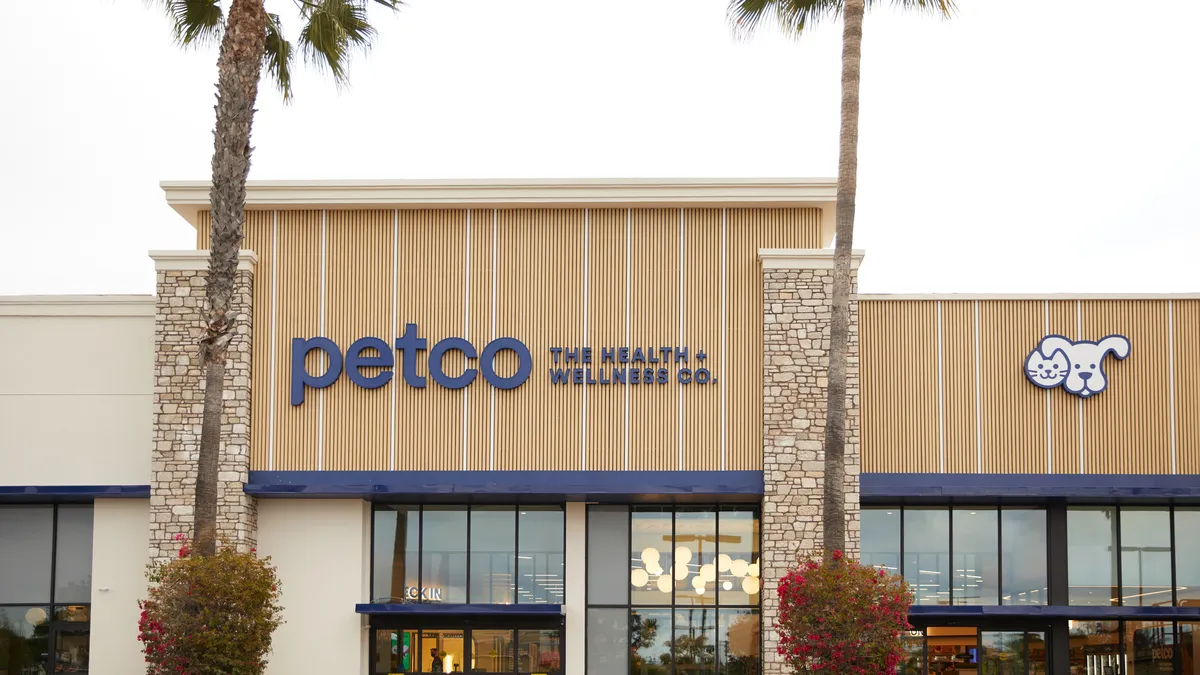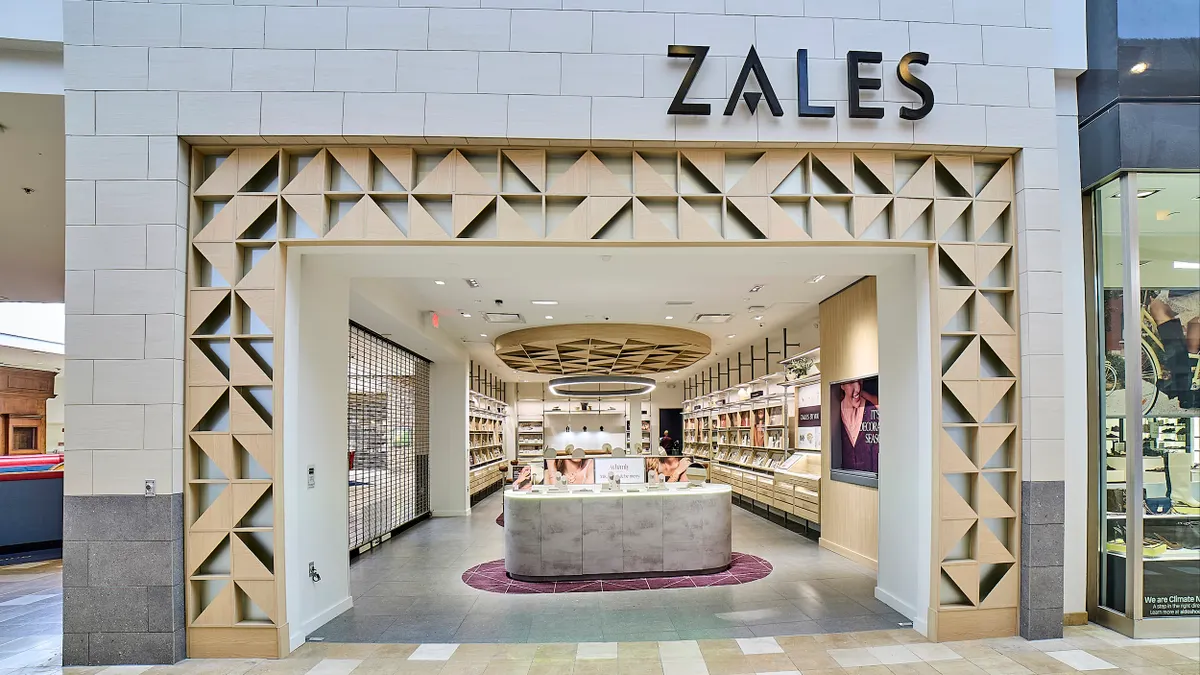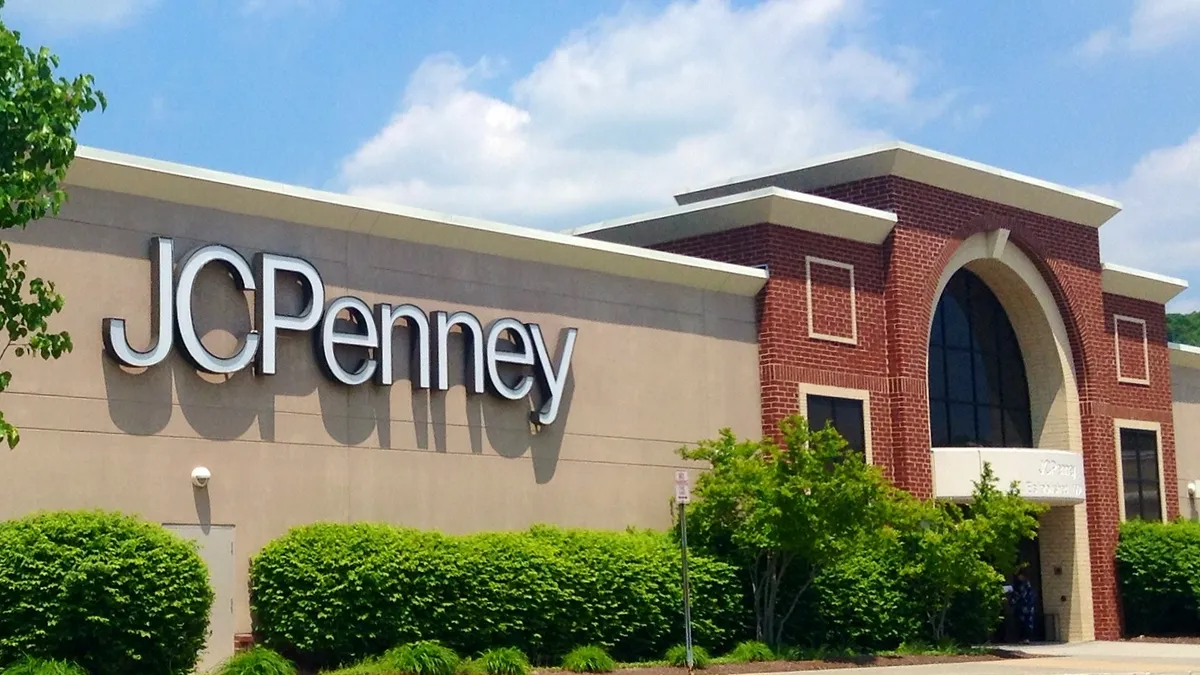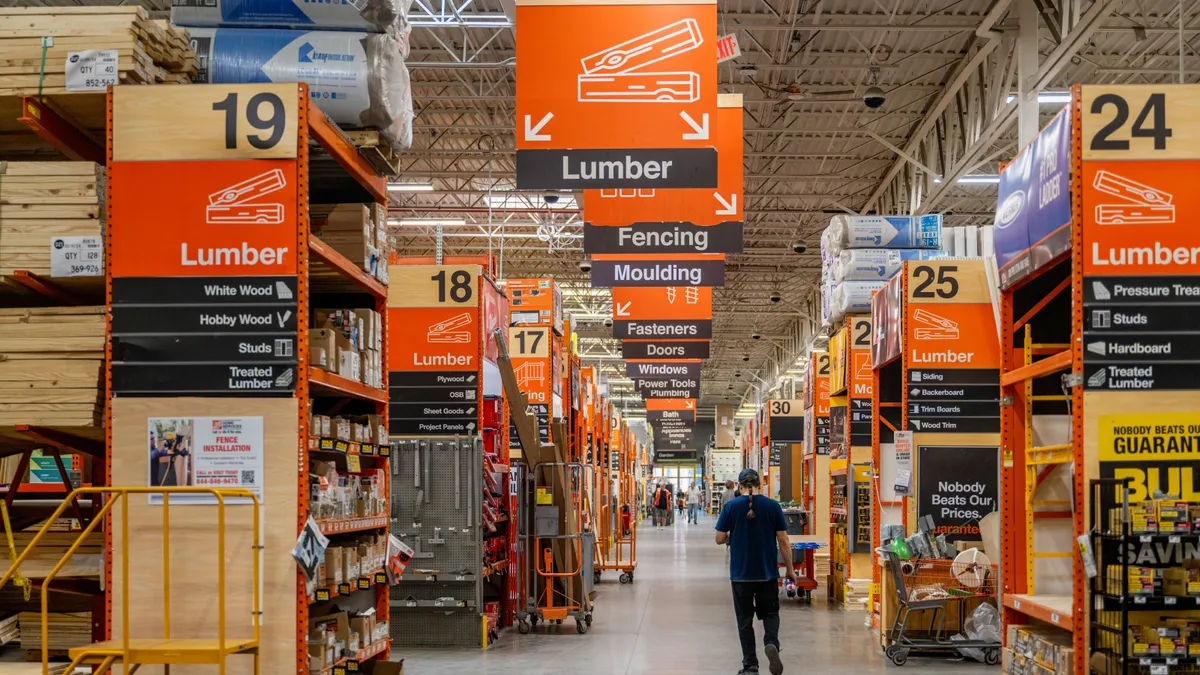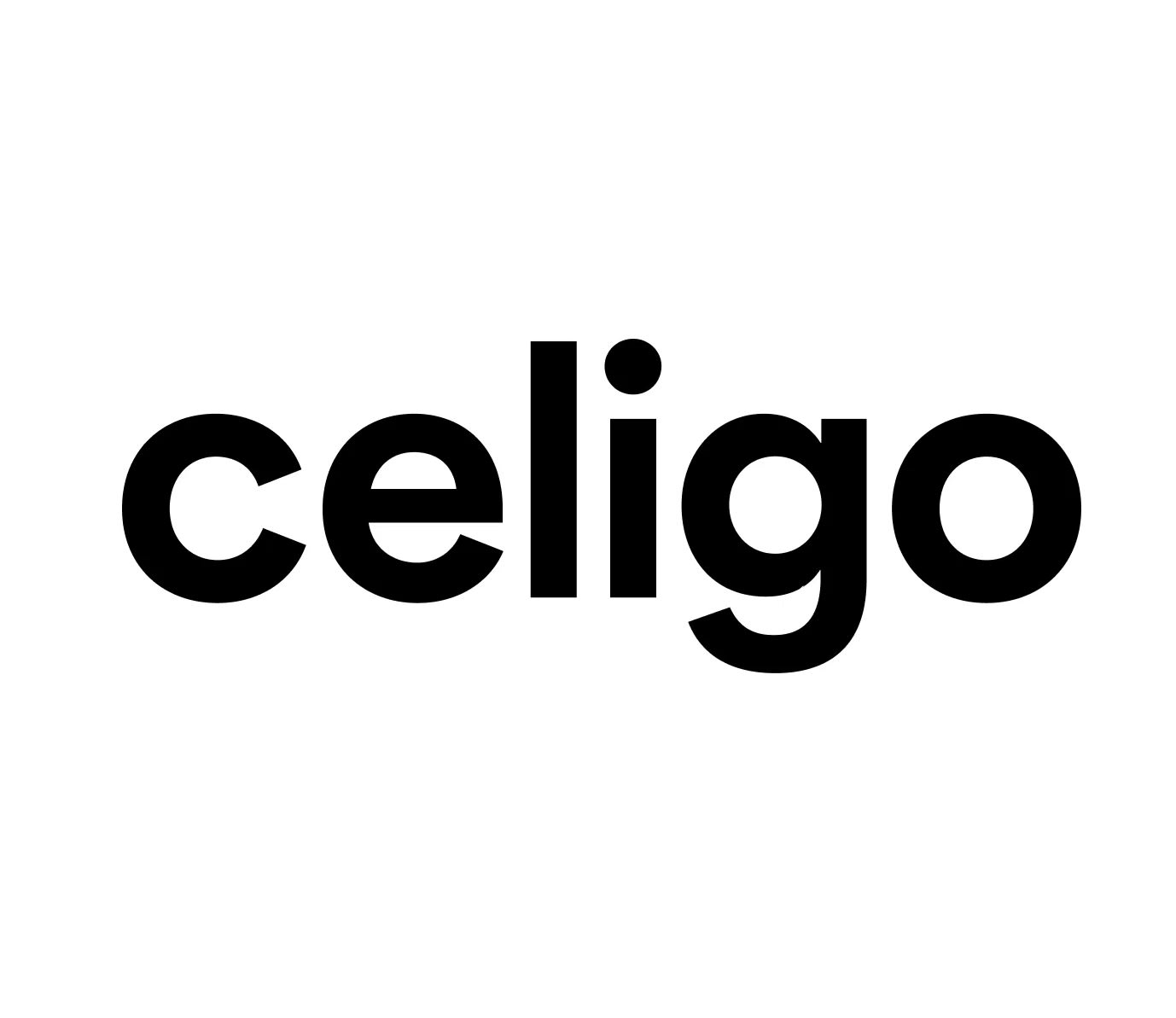Petco's on a roll.
The specialty pet retailer in 2022 alone has introduced new store formats in underserved markets, partnered with home improvement retailer Lowe's for shop-in-shop concepts and reported record revenue and profits, all while continuing to lean into its promise of being a health and wellness destination for pets.
But things haven't always been so rosy for Petco. In 2020, the pet retailer had a Caa1 rating and negative outlook from Moody's, making it a high risk of defaulting on debt.
And over the years, Petco underwent a number of private equity buyouts, and it entered — and exited — the public markets several times.
But now, the retailer appears to be on a different path.
"It's really a reconceived strategy around services and around the importance of omnichannel. Those are the two big changes to this company under CEO Ron Coughlin," Wedbush analyst Seth Basham told Retail Dive.
Coughlin joined Petco in 2018 and in the years since has helped reshape the retailer into a health and wellness destination for pet parents, adding vet hospitals and introducing healthier food brands to its shelves, among other things.
The retailer has introduced a number of initiatives to secure its place in the sector and in 2021 re-entered the public markets for the third time. Is Petco now positioned for long-term growth?
Prioritizing health and wellness
Petco in 2020 announced it was repositioning itself as a health and wellness company for pets. The move coincided with a growing trend around the humanization of pets. More and more, pet owners have viewed their animals as extensions of their family and have begun to treat them as such, including by seeking out better-for-you options when it comes to foods.
"Pet owners put more effort and investment into the care for their fur babies, and pet owners are prepared to spend extra on the special food category for their animal," Inna Kuznetsova, CEO of 1010data, said. "We see Petco recognizing and addressing" those needs, she added.
The retailer in 2018 announced it would no longer sell products on its shelves that were made with artificial ingredients, and made good on that promise the following year. Petco has put an emphasis on more fresh and frozen foods, even opening a Just Food For Dogs kitchen in its New York City flagship in 2019.
But Petco hasn't just addressed more health-conscious consumers through the products it sells, but also through the services it has introduced over the years.
The retailer runs thousands of mobile vet clinics and has some 200 vet hospitals, opening 24 in the fourth quarter of 2021 alone. Last month, Petco announced it purchased the remaining stake in its pet hospital joint venture with Thrive Pet Healthcare, which operates around 100 vet hospitals in Petco stores under the Thrive name. The companies initially formed the strategic joint venture in May 2017.
"The pet hospital rollout — 60 to 70 per year — that's going to give them a boost to comparable store sales of anywhere from 200 to 300 basis points in the next few years, as we see that ramp continue to build," Basham said.
Petco in 2020 introduced Vital Care, a paid annual membership program that gives pet owners access to services like unlimited vet exams, nail trims and teeth brushing, as well as a rewards program. The company last month announced it enhanced the program, including by creating a program tailored to cats.
"It's a recognition of where they're taking the company and it's not just selling pet food and supplies, but being a one-stop shop for all pet care needs," Basham said. "The health and wellness of pets — driven not just through food supplies, but also grooming, training and of course veterinarian care — I think are key aspects of how they want consumers to view their company."
The focus on wellness complements Petco's other services, including grooming, training and boarding, which executives recently said have been reinvigorated.
Providing services in stores "helps, certainly, create some stickiness, more reason for the consumer to come back to the store or the pet hospital on a regular basis," Basham said. "Then to wrap it in with subscription programs like Vital Care, I think is also very valuable to hold on to that customer that they may have gained during the pandemic."
But, as Basham notes, these building blocks were in place well before the pandemic took hold, putting Petco in a good position when demand suddenly spiked in 2020.
The pandemic helped accelerate Petco's growth. The pet sector as a whole experienced a boost as more consumers adopted pets to provide a sense of comfort and relief during a time when much of everyday life seemed uncertain.
Petco in particular experienced an 11% net sales increase during 2020 and an 18% year over year increase on top of that in 2021. The retailer also swung to a profit last year, of $159.8 million, after years of losses.
"Petco has well capitalized on the overall growth of the pet food space online during the pandemic," Kuznetsova said. "They created very good visibility, and presence, and sales, and marketing that led to them growing higher than the market."
The total online pet food market in 2020 grew 42.3% year over year, according to 1010data. But Petco far outpaced that, growing 110.3% during the same period. While growth slowed in the category in 2021, the retailer continued to outperform the market, growing 27.7% year over year compared to the total market's 15.9% growth.
The competitive advantage
As demand for pet products grows, so has the competition specialty pet retailers face, namely from mass merchants.
Amazon in 2018 launched its Wag private label. Walmart in 2019 announced plans to open 100 in-store vet clinics as well as carry prescriptions for dogs, cats, horses and livestock from over 300 brands at WalmartPetRx.com. And Target last year rolled out a private label pet food brand, dubbed Kindfull.
But despite these efforts, Wedbush's Basham still thinks there's a place in the market for specialty pet retailers. Petco has "a lot of brands that are still exclusive to the specialty pet bricks-and-mortar channel. They have some differentiated private label brands — Reddy being first and foremost — that helped from a merchandising standpoint, and then you layer on the services," he said. "They have so many options that make it attractive to certain segments of customers."
Petco appears to be making a big bet on its Reddy brand, which features high-quality, functional and sustainably made products. The retailer in October opened a flagship dedicated to the brand in New York City's SoHo neighborhood.
"It's more about attracting new customers, showcasing what they have — high-end private label pet care products — and seeing the kind of interest there is from that type of high-end consumer that's shopping in SoHo. It's potentially an opportunity for them," Basham said, noting that while the Reddy store may not become a widespread concept for the retailer, it serves as a testing ground for new products to see what resonates well with consumers.
The store, which is situated down the street from high-end brands like Loewe, Marc Jacobs and Ted Baker, appears to be going after a more affluent urban consumer.
"The Reddy brand is focused. It has a purpose. It's in downtown New York City in a really fashionable area, and it serves a purpose in that particular location," Stefan Kahandaliyanage, Moody's vice president and senior analyst, said.
Petco earlier this year also announced a partnership with Lowe's in which the retailer would open branded shop-in-shops within the home improvement stores. The tie-up will place a curated selection of pet nutrition and supplies from Petco's private labels, as well as national brands, in designated areas of Lowe's stores and provide customers access to Petco services including vaccination clinics, microchipping, prescription pest prevention and mobile grooming. The companies initially launched the concept in 15 stores across Texas, North Carolina and South Carolina.
Some analysts, however, are skeptical on the long-term value it will provide to Petco.
"I don't think it means a lot to the investment case for [Petco]. We have seen pet supplies and food in a limited basis, trialed in home centers many years ago without success," Basham said. "I don't think that it's going to become a major channel for Petco, so I'm not putting much faith into it."
But 1010data's Kuznetsova points to other partnerships retailers have formed, like Ulta with Target and Sephora with Kohl's, as an indication that a partnership between Petco and Lowe's may end up being a smart play.
"Any kind of convenience … while visiting other stores and grabbing a pack of food or litter for the pet is really helpful and clearly benefits the customer," she said.
And to expand its reach even further, and tap into new markets, Petco at its investor day last month announced a new store concept catered to rural consumers.
"The storefront is the look and feel of a Tractor Supply. They talked a lot about feedstock in addition to pet dog houses — no one in New York City puts their dog in a doghouse," Kahandaliyanage said. "But there's a real market out there that they're going to hit with this new concept."
But just because the market's there, doesn't mean it's an automatic "slam dunk" for Petco, according to Kahandaliyanage. Retailers operating in this sector — Tractor Supply and upper midwest retailer Fleet Farm, in particular — have loyal customer bases that Petco will need to compete to win over.
"These are highly competitive" retailers, he said. "But [Petco] has a distinct approach to pet care and that may stick."
The pandemic-induced trend of residents moving from metropolitan centers to suburbs and even rural areas of the country also expanded the target customers in these regions, Kahandaliyanage added.
"People have country homes in Vermont or the Hudson Valley or the Catskills. People are spending more time in these places because of the work-from-home culture that the pandemic has ushered in," he said. "Rural markets are actually changing, especially rural markets that are around metropolitan hubs."
But beyond the new store concepts Petco has introduced over the last six months to attract new customers, the retailer has leaned on its stores to serve as fulfillment points for online orders, giving it an advantage over one of its biggest competitors: Chewy.
Petco's stores "enable consumers to pick up a product on an immediate basis, get advice from a person live — being a sales associate — versus somebody over the phone at Chewy, and being able to offer some of those services like the pet hospital services in the stores, as well as grooming and training in some cases," Basham said. "You have a more comprehensive set of services than you could get through Chewy. And when we compare it to other bricks-and-mortar pet retailers, a lot of the same things can be said: Most don't offer all those services in addition to selling the products. Putting those together as a one-stop shop is very appealing to a certain demographic of pet parents."
And while the digital channel for Petco still remains relatively small, it's "growing rapidly and provides an advantage with same-day delivery and buy online, pick up in store … They've come to the conclusion that there's certain customers who really want to shop that way, but not all want to be fulfilled through two-day delivery," Basham added. "The services element at Petco and the competitive advantage relative to other bricks-and-mortar competitors really gives them an ability to grow faster than the market, so they'll be taking market share."
In-store fulfillment options can ultimately lead to cost savings for Petco, especially given how the price of fuel has skyrocketed recently.
"When we think about what's happened to gas prices — the cost of the last mile — it's tremendous savings directly passed on across stakeholders, customers, providers of capital," Kahandaliyanage said.
But those sky-high gas prices, coupled with inflation and the possibility of an economic recession, may cause consumers to think twice about certain purchases. But experts don't anticipate pet retailers to be highly impacted.
Retailers in the sector have historically been hailed as recession-proof because many of the products sold could be considered non-discretionary, as opposed to a category like apparel, Kahandaliyanage said.
"The proposition with Petco is, 'We're going to be competitive on price within the market.' And people are going to use their services," he said. "Healthcare is pretty non-discretionary."



